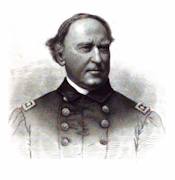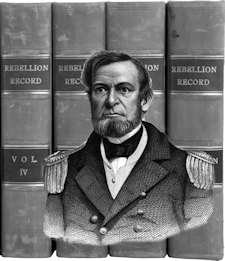9th. Mr. Haynes came to camp, brought a letter to me. Went over and ate some doughnuts. Gay time in the evening.
Monday, January 9, 2012
Thursday, January 9, 1862. Raleigh, Virginia, (Beckley’s Court-house). Cloudy; rained during last night, thawing, foggy, etc., etc. Rode with Avery to the mill of young Mr. Beckley on Piney River. Found it a most romantic spot. Beckley’s family, a pretty wife and daughter, there in a cabin by the roaring torrent in a glen separated from all the world. I shall long remember that quiet little home. — One man of company died at Fayetteville.
Jan. 9. As bright and lovely a morning as ever dawned on Chesapeake bay. The expedition sails today. The harbor is full of life, tugboats are running in all directions, vessels are getting themselves in their order in line, the anchors are all up and waiting the signal gun to start.
10 a. m. The signal gun announces that all is ready for the departure of the expedition. Slowly the flag-boat, containing Gen. Burnside and staff, moves off, followed by other boats as fast as they get ready to sail. Nothing particular occurred during the day’s sail. The bay is wide and we were so far from either shore that we could distinguish nothing of interest. We passed the mouth of the Potomac river a little before sunset, and shortly after dropped anchor for the night.
Thursday, 9th—Some of the boys go out into the country almost every day on foraging expeditions and bring in an abundance of things to eat, so that with our regular rations we are pretty well supplied.
January 9 — Weather is getting warmer. It rained all last night. This morning we renewed our march over a very muddy road. At eleven o’clock we passed the camp of the Seventh Brigade of Virginia Militia.
This afternoon we passed Jackson’s camp. We marched till nearly night, and are camped on top of a high hill, from which we can see Jackson’s and General Loring’s camps not far away. Loring’s Brigade came recently from Valley Mountain in Southwest Virginia, and is operating with Jackson in this winter mountain expedition. This camp is on the Martinsburg and Romney road, near Unger’s store, on the southern edge of Morgan County, about twenty-two miles north of Winchester. We remained in this camp until the morning of the 13th.
Headquarters 2d Brigade,
Beaufort, S. C. Jan. 9th, 1862.
My dear Mother:
It is with great pleasure I am able to write of my rapid recovery from a somewhat severe illness. I caught the fever prevalent in this country, and lost all those pounds of flesh of which I have boasted, but am thankful to be again restored to health, if not to full strength, and am gaining rapidly. There is little chance of obtaining a leave of absence, for, though delightful as it would be to see you all again, it is not well to look back when the hand is once put to the plough. You will ere this have received an account of our New Year’s call over on the mainland of South Carolina. It was very successful, but I was unable to be present, as excessive exhaustion, the result of the fever, kept me confined in bed. The weather down here is charming now, the sun is as warm as summer. I think of you suffering from cold. I would be willing to exchange the warm sun of Beaufort, though, for a couple of weeks in the chilly North where there are warm hearts ever ready to welcome me. I am going to enclose to you a copy of a Secession letter which may afford you some amusement.
I have not received either my trunk or sword yet, though they undoubtedly are at Hilton Head, but the express agency is a slow working affair, and I must abide their time patiently. Yesterday was the anniversary of the battle of New Orleans. In the evening the General had a reception, at which many patriotic speeches were made, and a general feeling of jollity prevailed. There is little news to communicate. Your letters come regularly. I have received Hunt’s photograph, which is capital. I hope gradually to get the likenesses of the whole family.
There is at presents far as we can learn, a general feeling of depression among the South Carolina troops, which possibly may eventually develop into a Union sentiment. The feeling the soldiers express is: “We have no negroes to fight for, while the slave-owners have all taken good care to retire to the interior of the State where they can live in safety.” The question is beginning to pass among them, “Why should we stay here to be shot, when those who have caused the war have run away?” This is dangerous talk, and, we are told, officers have great difficulty in maintaining the organization of their Regiments. At least these are stories brought by the negroes who are continually escaping to our lines, and the unanimity of their reports seems to lend the appearance of truth to them. The fact is, the frightful effects of the explosions of the 11 inch shell which some of our gun-boats carry, have produced a great panic among the land forces of South Carolina. Negroes from Charleston report the city in a great fright, the inhabitants making preparation to leave at the sound of the first note of alarm. I hope we may catch old Tyler.[1] It would do me a deal of good to see the traitor sent North to be dealt with properly. There is a strong contrast between the treatment of our prisoners, and that received by the unfortunates who fall into the hands of the “chivalry.” The prisoners we have here are certainly as well treated if not better than our own soldiers. As I see them, on passing their place of confinement, with their legs hanging out of the windows, smoking their pipes, lolling about, enjoying fires when it is chilly, I cannot but think of a poor fellow named Buck, a German in my company and a capital fellow, who was captured at Bull Run and taken prisoner to Richmond. Once he ventured to put his head out of his prison window, and in an instant the guard shot him dead. I remembered too an amiable practice of the chivalrous youth of Richmond, who, when drunk, were in the habit of discharging their pieces from below, sending the bullets through the floor of the prison. This piece of pleasantry they termed “tickling the legs of the Yankees!” Well, we are not barbarians, and the other day a poor fellow whom we took prisoner at the battle of the Coosaw, as he lay grievously wounded, but receiving every kindness and attention at our hands, said: “Ah, there’s a mistake somewhere. We think you come here to murder and burn and destroy.” It will take time, but we believe by making ourselves dreaded in battle, but using kindness to all who fall into our power, even South Carolina may learn the lesson that there is a mistake somewhere.
There, I think I have written a long letter. With much love to all, I remain,
Your affec. son,
Will.
[1] John Tyler.
Navy Department, January 9, 1862.
Sir: You are hereby appointed to command the Western Gulf Blockading Squadron, and you will proceed to Philadelphia and report to Commodore Pendergrast; and, when the United States steam sloop-of-war Hartford shall be prepared in all respects for sea, you are authorized to hoist your flag on board of that vessel.
The Western Gulf Blockading Squadron commences at, but does not include, St. Andrew’s Bay in West Florida, and extends to the Rio Grande. The coast of Mexico and Yucatan will also be considered within the limits of your command. Further instructions will be issued before your departure.
I am, respectfully, your obedient servant,
Gideon Welles.
Captain D. G. Farragut,
Appointed to command the W. G. B. S.,
Hastings on Hudson.
Thursday Jan’y 9th 1862
In the office as usual. It rained most of last night. Warm today, very foggy tonight. I have spent the evening at home. The boys read, write, spell & cypher and “Bud” gets a Latin lesson every day. There is a good deal of sickness in the City and many deaths at the Military Hospitals daily. Julia was vaccinated today by Doct Gibbons for Kine pox. The small pox is very prevalent. No War news today. Everything quiet. Congress seems to be doing but little. The Republican Party is split betwen the Abolitionists and the Conservatives. The latter support the measures of Mr Lincoln, which is to save the Union, crush the rebellion, and let Slavery take care of itself.
The Douglass Democrats support Mr Lincolns policy also. He has in fact the strength of the Country with him.
______
The three diary manuscript volumes, Washington during the Civil War: The Diary of Horatio Nelson Taft, 1861-1865, are available online at The Library of Congress.
JANUARY 9TH.—Butter is 50 cts. per pound, bacon 25 cts., beef has risen from 13 cts. to 30 cts., wood is selling for $8 per cord, but flour is abundant, and cheap enough to keep us from starving.
January 9.—The Provost-Marshal General, at St. Louis, Mo., issued an order, requiring all publishers of newspapers in the State of Missouri, St. Louis city papers excepted, to furnish him a copy of each issue for inspection, and failure with such order would render the paper liable to suppression.
Great excitement occurred in the Chamber of Commerce, at St, Louis, this afternoon, on the occasion of the election of officers, which resulted in the disruption of the Chamber by the withdrawal of the Union members, who subsequently established a Union Chamber of Commerce, which will be immediately carried out. The trouble occurred in consequence of the secession members refusing by their votes to admit a number of Union applicants for membership.
—The vessels, containing the Third and Fourth brigades of General Burnside’s expedition, left Annapolis (Md.) harbor, for the rendezvous at Fortress Monroe.—Baltimore American, Jan, 11.
—In the Senate of the United States, Mr. Sumner delivered an elaborate and powerful speech on the “Trent” affair.
—Col. H. Anisansel, commanding at Clarksburg, Va., returned to that place to-day, having been out with two companies of the First Virginia Cavalry, and three companies of infantry, in search of some military stores, which had been taken by bushwhackers, at Sutton, Va. After some time, the Colonel came up with the rebels, about thirty miles east of Sutton, killed twenty-two of them, took fifteen horses, and fifty-six head of cattle, and recaptured the greater part of the stores, though in an injured condition.—Clarksburg Telegraph, January 10.











